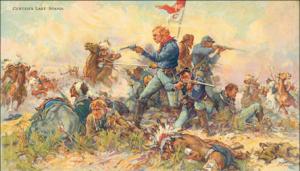 A day in June not long 'fore noon two hundred soldiers died.
A day in June not long 'fore noon two hundred soldiers died.
They took their stand on barren land; they had no where to hide.
"A massacre! A disaster!" The papers' headlines screamed.
"Such idiocy! Stupidity!" George Custer was blasphemed.
Detractors said the man who led the Seventh Cavalry
sought only fame, public acclaim for guts and gallantry.
After the War there was rancor as pioneers moved west.
He led campaigns across the plains, his goal to stop unrest.
The treaties lied some chiefs decried and braves went off to fight.
When Custer's troops chased them in loops, they lost their trail at night.
Some braves appeared then disappeared; the hunt went on for weeks.
"They cannot flee. Where can they be?" Troops looked up draws and creeks.
On steep incline while seeking sign of wily Injun foe,
Scouts saw tipis among the trees on Greasy Grass below,
Then just past dawn with sabers drawn they charged; a bugle blew.
A big mistake, so much at stake when fighting angry Sioux.
What happened then to all these men the experts can't agree.
On open ground too many found and slaughtered rapidly.
These heroes stood long as they could until they were cut down.
Fought hand-to-hand to the last man. The Seventh earned renown.
|
| Writing Prompt |
Write a poem of any type and any length that tells a story. |
Author Notes
This painting is one of many depicting the romantic version of Custer fighting to the very end. No one knows exactly when during the fighting he was killed.
Actually nearly 220 soldiers died that day.
The War alluded to is the Civil War where Custer proved his bravery at the Battle of Gettysburg and many other skirmishes.
After the war Custer became an Indian fighter and was appointed by General Phillip Sheridan to lead the Seventh Cavalry.
There were many treaties signed by Army officers and Indian chiefs that were broken or ignored between 1866 and 1876. Indians agreed in some cases to live on reservations, but left them when promises were not kept by the Americans.
Custer and his troops had constantly hunted for renegade Sioux and Cheyenne who left the reservations and attacked settlers. He was part of a three-prong campaign involving two other generals when he came upon a large Indian encampment on the Little Big Horn River (aka Greasy Grass).
What really happened that day is still an ongoing debate although much new evidence has come to light.
This type of form is called a SERVICE poem and is modeled after the narrative poetry of Robert Service, the Bard of the Yukon who wrote "The Shooting of Dan McGrew" and "The Cremation of Sam McGee." It features lines with seven beats and internal rhyme. End rhyming is in couplets.
|
|



